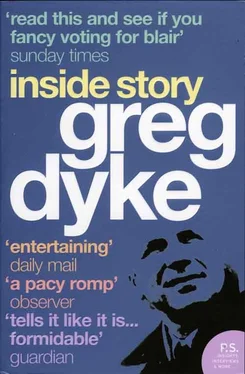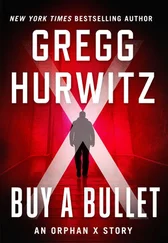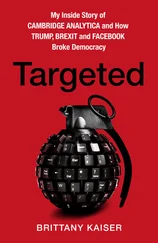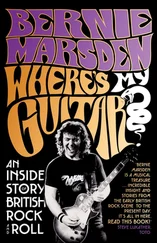I tried to plough on through the report but rapidly discovered it was a cut and paste job. It felt like Hutton, late in life, had learnt how to use Microsoft Word: the report was largely made up of tracts of evidence given to the inquiry with Hutton’s opinion simply tacked on at the end, often without any explanation as to how or why he had reached his conclusions. When writing about the report later, the former editor of The Times , Lord Rees-Mogg, agreed. He called it a defective document in which the conclusions did not follow from the evidence.
I began to skim the document at about the same time as Mark Damazer stuck his head round the door to tell me that I only had to read the seven pages that made up Chapter 12 because the guts of the report was all there. This was the summary of Hutton’s conclusions and I read them in total disbelief. This man wasn’t on the same planet as the rest of us. Hadn’t he listened to the evidence? Hadn’t he listened to his own QC during the inquiry? How could he possibly have reached these conclusions?
Forty minutes after I started reading the report I walked into the adjoining meeting room where Sambrook, Damazer, and young Magnus Brooke were all sitting looking shell shocked. They tell me I said something like, ‘Well, boys, we’ve been fucked, so what are we going to do about it?’
In the week or two before publication we had worked on a whole range of scenarios for what Hutton might say and how we should respond. The problem was that none of our scenarios was as bad as the reality. In our scenario planning it had only crossed our minds once, and then only fleetingly, that Hutton might find that the dossier had not been ‘sexed up’ at all. We all laughed and dismissed it, as the evidence was so clear cut. But that was exactly what Hutton had decided. There had been no sexing up; even worse, he had found against the BBC and for the Government on virtually every single count.
The four of us rapidly and prophetically agreed that this report was so one-sided we didn’t believe it would turn out to be such good news for the Government as initially appeared to be the case. It was so much in their favour people would find it hard to believe. After all, dozens of journalists had sat through the inquiry and listened to the evidence. Surely they would see Hutton’s findings as completely inconsistent with the evidence? And what about the wider public? They had followed the inquiry in large numbers and would surely see the same inconsistencies. Interestingly, over at The Sun newspaper, which, unbeknown to any of us, had illicitly obtained a copy of the report, the reaction was very similar. There the paper’s editor, Rebekah Wade, and her team immediately saw that the report might be seen as a complete whitewash.
The problem we faced on that Tuesday was: how long would it take before this happened, and what would our defence be in the meantime? We discussed a strategy and decided to stick to the plan we had developed in advance. We would say that most of the criticisms of the BBC had been acknowledged during the inquiry; that, as a result, we had taken steps to improve our procedures; and that we would soon announce changes to the BBC’s editorial guidelines. However, I did add a new line. We would also say, on the crucial issue of reporting a confidential source, that we had real doubts whether Lord Hutton had got it right, that he had misunderstood the law, and that his conclusions were a threat to free journalism in the UK.
Around 2.30 p.m. we went down one flight of stairs to see the BBC Chairman Gavyn Davies. He was with the two other BBC Governors who had been allowed to read the report in advance – Pauline Neville-Jones and the Vice-Chairman, Lord Ryder. Both were very Establishment figures. Richard Ryder had been Chief Whip in the last Conservative Government and Neville-Jones had been a career civil servant at the Foreign Office and was a former Chair of the Joint Intelligence Committee (JIC). She had left the Foreign Office when she was not appointed Britain’s Ambassador in Paris.
I can’t say I liked Pauline Neville-Jones, but I did have some respect for her. She was one of a number of Governors who had fought against my appointment as Director-General four years earlier and was still a powerful voice on the current Board, which was a bit short of people with authority. She certainly worked harder than any other Governor in my time at the BBC, was obviously very clever in a manipulative Foreign Office sort of way, and had successfully sustained the BBC’s close relationship with the Foreign Office. This mattered because it was the Foreign Office who funded the BBC World Service.
But neither I nor the two BBC chairmen I worked with, Christopher Bland and Gavyn Davies, ever totally trusted Pauline. She applied to be Deputy Chairman of the BBC when Lord Ryder was recruited and was turned down. She was incredibly ambitious but I always suspected she had not been as successful in life as she had wished or expected.
On the other hand, I did like Richard Ryder. I first met him at the Conservative Party Conference a decade or so earlier when I was Chief Executive of London Weekend Television and found him quiet and thoughtful, unlike most politicians. He had been one of the people who had worked with the public relations guru Gordon Rees back in the late 1970s transforming Margaret Thatcher’s image, so he’d been around the fringes of politics for a long time. When he became Deputy Chairman of the BBC he was still on the Board of Ipswich Town Football Club, and as a former Director of Manchester United I had plenty to chat with him about. The problem with Richard was that he had been recruited as Deputy Chairman to help build a relationship with the Conservative Party but quite clearly disliked many of the people now leading it. He had failed to make a single speech since he was elevated to the House of Lords in 1997 and seemed reluctant even to attend, let alone host, lunches and dinners in the Lords in support of the BBC. People in both Public Affairs and the Secretary’s office at the BBC complained all the time that he didn’t work hard enough to be the Deputy Chairman.
When we met up with Gavyn, Pauline, and Richard they, too, seemed shocked. Pauline said she was horrified by the report; Richard said very little. Gavyn told us that he had been told by a close friend that we had made a mistake co-operating with Hutton in the first place and that from the moment this particular judge had been appointed the result was a foregone conclusion. Our only hope, according to Gavyn’s friend, had been to attack the way Hutton ran the whole inquiry at every available opportunity: that way we would have been able to demonstrate that he had been appointed by the Government to deliver a verdict that would favour them. It was an interesting perspective but hardly relevant to the position we were now in. In the middle of this discussion Tara Conlan, a journalist on the Daily Mail , rang Gavyn on his mobile phone and asked him openly what was in the report. We all laughed as he gave her a very polite brush-off.
By late afternoon we moved to a bigger room, where we were joined by our legal and press teams. Our QC, Andrew Caldecott, turned up with a comprehensive argument detailing how Hutton had completely misunderstood the law on ‘qualified privilege’, which covered the rights journalistic organizations now possessed. In the end we split into two groups, one to plan strategy and the other practicalities.
I worked on a comparatively aggressive statement, which we would put out the following day and which we’d all agreed Gavyn was to deliver. Together we watched the result of the parliamentary vote on tuition fees, which took place around 7.00 p.m. We got even more depressed when the Government narrowly won, thanks to Gordon Brown delivering his supporters at the last minute. Our reaction was nothing to do with the pros and cons of the issue; we simply thought we’d get an easier time the following day if the Government had another crisis on its hands.
Читать дальше












